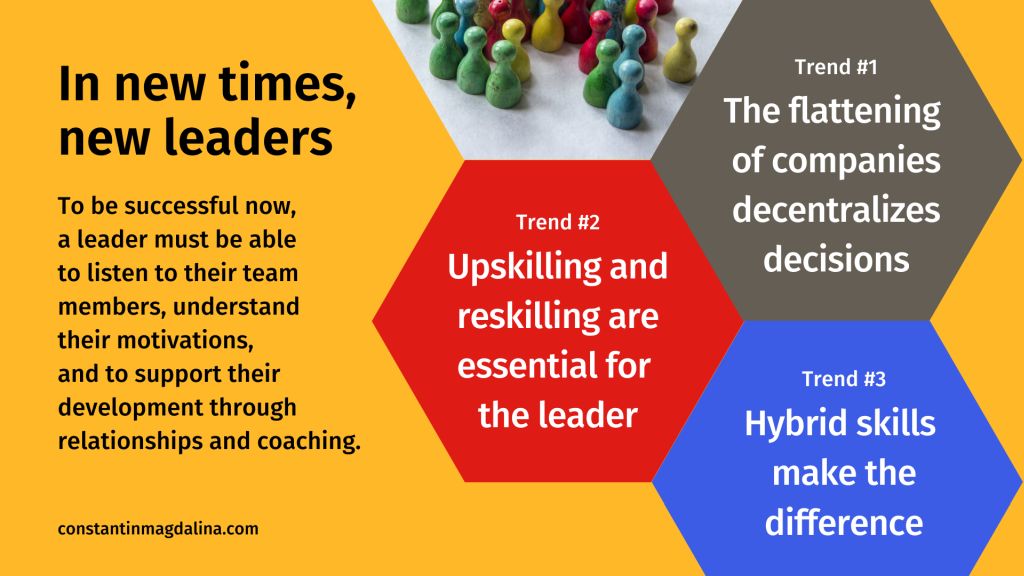
In today's increasingly volatile environment, companies are looking for better ways to prepare their leaders to be agile and relevant. The "new normal" certainly has a lot of threats and obstacles, but it also has a lot of opportunities. To help companies meet the new challenges, we have identified the three most important trends in leadership and, consequently, in leadership development programs in the coming years.
The flattening of companies decentralizes decisions
More and more companies are adopting flatter structures. This is because business leaders today believe that this leads to lower operating costs, better communication, and increased employee motivation, given the changes in the workforce and the workplace. With a slightly more flattened structure, companies will have a less centralized authority, expertise and knowledge will be dispersed on a broader basis than most leaders were accustomed to managing.
In a volatile and unpredictable environment, no one can know everything and can no longer lead their teams and companies alone. Due to technological developments, the information flows change and go across ordered hierarchies along reporting lines, from leaders to their teams, in which employees interact freely with each other and with external experts.
In this context, the image of what the leader is changing. The "individual hero" or the "smartest person in the company" who needs to know everything and do micromanagement belongs to the past. Flatter structures require collaborative, agile, well-connected, and cross-functional leaders who can adapt quickly to complex and ambiguous situations.
These new leaders need to be able to work with people who are smarter than themselves and who have expertise in areas they don't have. Now, to be successful, a leader must be able to listen to their team members, understand their motivations, support their development through relationships and coaching, as needed.
Upskilling and reskilling oneself and teammates
The amount of information available and its circulation speed is likely to continue to grow in the coming years. Faced with the unstoppable evolution of technology, companies will need to be prepared to outsmart the competition. That is why lifelong learning in the workplace will be needed not only to stay ahead of the competition but to address possible skills gaps in the future.
Improved and retrained teams will help companies become more agile and increase employee productivity and motivation - all the more necessary as employees work increasingly more from home. But this process will have to be led by the management team. Subordinates to whom managers constantly tell them to develop in certain areas begin to wonder why “leaders” do little to grow visibly themselves. The leaders of the future will need to be aware of their own development needs while encouraging subordinates to do the same, to strengthen their influence and not the authority given to them by the position.
Leaders need to reflect on their own and their team's level of training to meet the challenges. On a personal level, they need to know what lack of knowledge and skills they need to address as they progress, continuously increasing their capabilities, without being told to do so by subordinates or superiors.
At the team level, leaders need to ensure that resources are available for direct subordinates to be held accountable and to lead their development. This will require long-term investment, but these efforts will lead to more involved, productive, and happier employees.
The mix of hard and soft skills
The trend for hybrid skills was already under discussion in the labor market years before the pandemic. Indeed, the definition may not have been as clear back then, but companies like Valoria Business Solutions, which rely heavily on data, conducted a 2021 study on Trends and Challenges in Remote Recruitment. The relevant conclusion about employee development trends shows that although technology is important, it is not the only driving force. In other words, as the job changes, the most important is the right combination of technical skills and interpersonal skills, namely a framework that intertwines and covers the needs of personal growth within a company.
The combination of superpowers of the right and left cerebral hemispheres needed to succeed in the workplace has been widely addressed in both popular books and academic publications. Wide areas of expertise have even been identified, covering both soft and hard skills, which leaders should focus on. What is worth remembering is that lifelong learning is vital to combine the two types of thinking, that a minimum of learning time should be allocated weekly within the company and at all levels to instill a true culture of learning.
In conclusion
Leaders should invest time in “setting off the dynamo” that fuels the company's engine, navigating the unknown, developing hybrid skills, applying new skills in the workplace, and enabling team members to prepare for present and future disturbances.
Effective leadership is the key to business success. In an ever-changing business environment, leaders will need to adapt to uncertain and ambiguous situations, develop relevant skill sets, create meaningful and collaborative interactions, and empower teams to perform. Lifelong learning is imperative for all of us. There is a vital opportunity for everyone to consolidate their work and shape their future.
About Constantin Magdalina
Constantin Magdalina has 10 years of working experience, while he performed in multinationals both in Romania and abroad. Constantin has a master’s degree in Marketing and Business Communication from the Academy of Economic Studies Bucharest. He is certified in Lean Six Sigma and ITIL which provide him a good understanding of processes and transformations within organizations. The Chartered Institute of Marketing certification furthered complemented his expertise and knowledge in business. In those over 4 years of working activity in a Big4 company, he initiated and conducted studies that analyzed different aspects related to the business environment in Romania such as the economic growth predictions of companies in 2013-2016, knowledge management, the buying experience in the age of digital consumers, social media 2013-2015, the utilization of mobile devices in Romania. He is the author of numerous articles on topics related to innovation, the efficiency of business processes, social media, the consumers’ buying experience in the age of digital, trends, and emergent technologies. He is invited as a speaker at numerous events and business conferences.

































